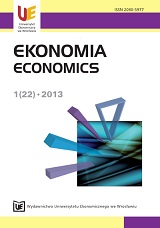Gospodarki oparte na wiedzy i usługach – analiza porównawcza
Economies based on knowledge and services – comparative analysis
Author(s): Grażyna Węgrzyn, Marcin BalanaSubject(s): Economy
Published by: Wydawnictwo Uniwersytetu Ekonomicznego we Wrocławiu
Keywords: service sector; Knowledge Based Economy; employment
Summary/Abstract: Contemporary highly developed economies are characterized by two universal trends. On the one hand one can easily notice that the meaning of the service sector increases both in the value added creation and in employment. On the other hand the importance of knowledge in economy is still rising too. The aim of the study is to identify main types of economies based on knowledge and services as well as to recognize the difference between these particular groups. Implementation of the research was conducted in two stages. The first stage involved the characterization of the nature of changes taking place in today’s highly developed economies. Then, an attempt was made to assess the severity of the construction Economies Based on Knowledge and Services across EU countries. The evaluation was performed using the following indicators: The Knowledge Economy Index (KEI), The Knowledge Index (KI), the share of services in value added and the share employed in services in the total number of employees. The obtained results enabled specifying five different groups of economies based on knowledge and services. Poland, together with Romania and Bulgaria, is in the group of least advanced countries in the transition to Economies Based on Knowledge and Services. This is a serious problem, because today’s economic development requires increased knowledge and innovation. Their diffusion in all sectors of the economy implies a socio-economic structural change and creates new opportunities to accelerate economic development. Without these processes more dynamic economy will not be able to achieve a sustainable increase in competitiveness, which is essential for achieving success in business competition.
Journal: Ekonomia
- Issue Year: 2013
- Issue No: 22
- Page Range: 61-72
- Page Count: 12
- Language: Polish

